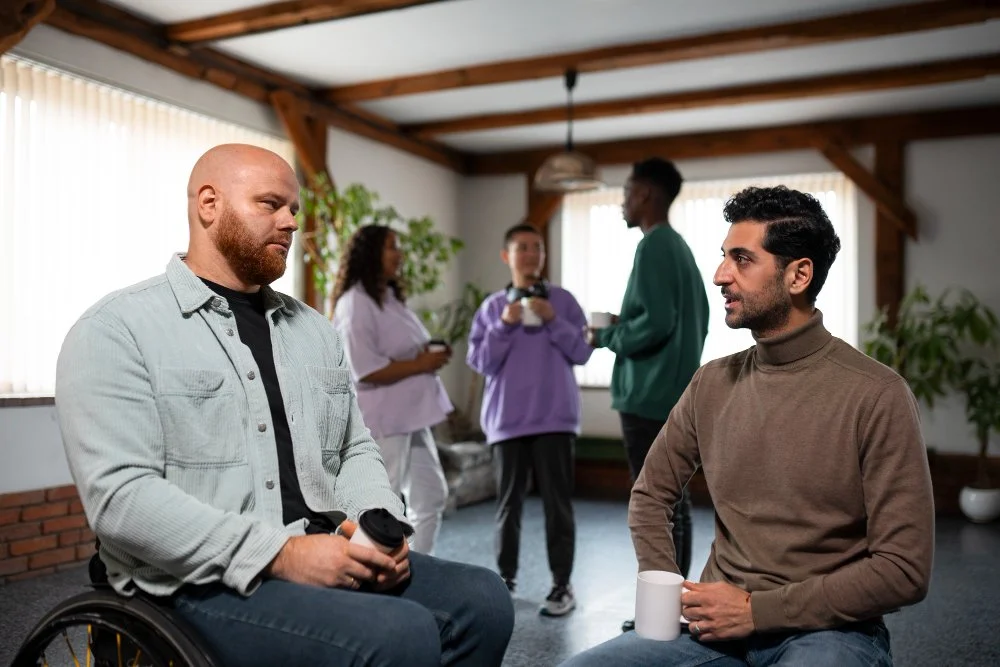Why Inclusive Mental Health Services Matter in Today’s Toronto
Known as a diverse melting pot, Toronto isn’t just multicultural—it’s one of the most multicultural cities in the world. Over half of the people who live here were born outside of Canada. That’s not just a fun fact—it’s a reality that should shape how we design public services, especially mental health care.
But for many Torontonians, therapy still feels out of reach. Not just for financial reasons, but often they haven’t felt emotionally, culturally, or personally seen.
So, what does truly inclusive mental health care look like in 2025?
Let’s break it down.
Diverse Population, Diverse Needs
Toronto is home to:
Over 250 ethnic origins
Residents who speak more than 180 languages and dialects
A growing LGBTQ2S+ community, with the city hosting one of the largest Pride celebrations in North America
A significant immigrant and refugee population, many of whom are navigating trauma, displacement, and culture shock
With such an array of diversity, it’s no surprise that people experience and express mental health needs in very different ways. For one person, therapy might mean unpacking racial trauma. For another, it could be working through intergenerational expectations, navigating a coming-out journey, or rebuilding life after war.
Inclusive care means meeting people where they are, not where the system assumes they should be.
Cultural Mismatch Is Still a Barrier
Despite Toronto’s diversity, many people report feeling misunderstood by their therapist.
A 2021 report by CAMH (Centre for Addiction and Mental Health) found that:
Racialized and immigrant clients were less likely to feel their mental health provider understood their cultural background
Many clients cited language, stigma, and miscommunication as reasons for discontinuing therapy
It’s not always about therapists being unkind or unskilled—it’s about a system that wasn’t built with everyone in mind. Inclusive mental health services are here to change that.
What Makes Mental Health Services Inclusive?
Being inclusive isn’t about checking a box or having a rainbow sticker on the door. It’s about meaningful, consistent action that makes therapy safer and more effective for clients they serve.
Here’s what true inclusion looks like in action:
• Cultural Competency: Therapists are trained to understand cultural beliefs, communication styles, and family dynamics—without assumptions or judgment.
• Gender & Sexuality Affirming Care: Clients don’t need to explain or defend their identity. They’re met with respect, not pathologized.
• Language Access: Services offered in multiple languages, with interpretation support—or even better, therapists fluent in a client’s first language.
• Trauma-Informed Environments: Everything from intake forms to session pacing is designed to feel safe, not overwhelming.
• Flexible Access: Options like virtual therapy, sliding-scale pricing, and non-traditional hours remove barriers that keep people out of care.
The Risks of Exclusion
When care isn’t inclusive, people fall through the cracks:
People don’t seek help because they fear being misunderstood or judged
They drop out of therapy due to cultural disconnects
They leave therapy feeling worse—or even retraumatized—by bias, microaggressions, or systemic gaps
In short, therapy that doesn’t feel safe doesn’t work.
The Benefits of Inclusive Care (And They're Measurable)
It’s not just about feeling good, it’s about getting better results.
Studies show that:
Clients who feel culturally matched with their therapist are more engaged and more likely to return for follow-up care
Inclusive care models reduce dropout rates, particularly among BIPOC and LGBTQ2S+ populations
Trauma-informed, identity-affirming care improves long-term outcomes, including anxiety, depression, and PTSD symptoms
Toronto-based clinics that implement inclusive frameworks have reported higher patient satisfaction scores and more positive treatment results across the board.
What to Ask When Looking for Inclusive Services in Toronto
Not sure where to start? Here are a few questions to ask a clinic before booking:
Do your therapists receive training in cultural competency or anti-oppressive practice?
Are any services offered in my native language?
Are your intake forms inclusive of gender identity and sexual orientation?
Do your therapists have lived experience with (or specialized training in) working with my community?
Trust your instincts. If a clinic doesn’t feel safe or affirming, you’re allowed to walk away. The right therapist will make you feel seen.
Final Thoughts: It’s Not Optional, It’s Essential
In a city as layered and vibrant as Toronto, inclusive mental health care isn’t an extra feature; it’s foundational.
Whether you’re a first-generation immigrant, a queer student, an Indigenous parent, or someone just trying to survive the day-to-day grind, you deserve care that gets you.
Inclusive services make therapy a place where healing doesn’t require translation, explanation, or apology—just space, support, and safety.
When people feel safe and supported, entire communities thrive.
Need support? Look for clinics that clearly state their values upfront. The good ones will make it clear: you’re not just welcome, you’re the reason they exist.


